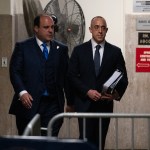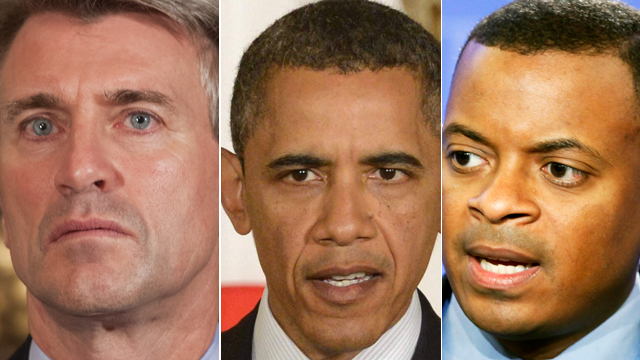If both parties agree on anything, it’s that “Washington insiders” are bad.
One way Obama — the ultimate Washington insider — is seeking to play up his connection to average Americans is by enlisting local faces voters might find familiar: their own mayors.
With congressional approval numbers at an all-time low and the president trying to sell his “we can’t wait” message focused on executive power, mayors have emerged as some of Obama’s top surrogates, stepping forward with anecdotes about stimulus funds revitalizing their cities, and stories of bipartisan coalitions tackling infrastructure projects, education reform and other Obama goals.
Newark, N.J.’s Cory Booker has traveled the Eastern Seaboard on behalf of Obama, touting the president’s expansion of Pell grants and commitment to equal rights. Los Angeles’s Antonio Villaraigosa, as chairman of the Democratic National Convention where Obama will be officially nominated, has an active role in helping the president win re-election. Minneapolis Mayor R.T. Rybak, a DNC vice-chairman, is a visible member of the apparatus dedicated to electing Obama, a position considered a reward for having been the first mayor of a major U.S. city to endorse Obama.
Rybak, who’s also head of the National Conference of Democratic Mayors, told TPM Obama united the mayors behind him early after seeing them split in 2008.
“Most of the mayors were originally for Hillary Clinton in large part because Bill Clinton did a phenomenal job for cities. And so mayors weren’t actively involved in the campaign until later. This time, as they sort of set out on the campaign, the idea was to have mayors be a lot more active,” he said. “I think I’m the first sitting mayor to ever be a vice chair of the DNC. And that was intentional.”
Ryback may have blazed a trail for mayors serving the DNC, but he’s not the only city executive with a high-profile place in Democratic politics. Rybak says Democratic mayors talk often and coordinate with the campaign and the DNC to do national appearances and push out talking points. Booker, a superstar in Democratic politics in his own right, has been on the trail for Obama since late last year, helping to fill a surrogate gap for the president created by the fact that so many faces of his 2008 campaign are now either in government or running for re-election themselves.
The benefits of mayors on the trail go beyond just having warm bodies to draw crowds and talk about the president, said Anthony Foxx, who, as Democratic mayor of Charlotte, has a large hand in executing this year’s 2012 Democratic National Convention, which is being held there.
“We certainly see in our communities the urgency of acting right now,” he said. It’s a notion Obama has made a centerpiece of his campaign — his “we can’t wait” slogan is aimed at persuading the public that he is willing to act when Congress isn’t.
“Any time you’re in an executive role, you know that you’re going to take some incoming for making any decision, and that’s unique to executive elected officials,” Foxx said. “You have to nevertheless chart a course for the future and you have to have the ability to galvanize people behind that vision and that’s something that mayors, governors and presidents all have in common in terms of what we do.”
Rybak said executives are better than members of Congress in other ways when it comes to selling the president’s vision. Congress is unpopular, while mayors are typically well-liked (or at least less-hated). They get things done, while Congress is generally deadlocked or in recess. Mayors, in short, are the kind of leaders Obama is trying to be on the national stage.
“It can be argued that mayors represent the last functioning form of government in the country,” Rybak said. “Maybe I’m putting that too strongly. But mayors have a lot of credibility these days that you don’t find in Congress.”
The Obama campaign, Rybak said, is intentionally leveraging that credibility by using mayors as surrogates.
Team Villaraigosa touts what they call the L.A. mayor’s bipartisan record, which has been heralded in the press. Villaraigosa is a prominent partisan supporter of the president and the Democratic party, but he can sell a vision of Democrats and Republicans getting stuff done together — which, of course, was the dream Obama sold on the trail in 2008.
The surrogate relationship is often mutually beneficial, and Villaraigosa’s role as chairman of the Democratic Convention and Obama campaign co-chair has raised his profile as it’s given Obama a prominent Latino voice and charismatic stand-in.
But Foxx said that despite his elevated profile, acting as an Obama surrogate and maintaining his bipartisan image in Charlotte requires a balancing act.
“Your performance as mayor is based on your performance as mayor, so I try to make sure that I keep the home fires burning, so to speak, and don’t get too far adrift on this other stuff,” he said. “But having said that I think the things that I’m doing, in terms of spreading the word about Charlotte, across the country are not at odds with my job. They’re part of my job.”
Mayors often work hard to burnish a bipartisan image: Like all chief executives, they try to stay above the partisan fray and focus on big accomplishments.
Indeed, as The New York Times reported this week, both Mitt Romney and Obama are actively working to score the endorsement of New York City Mayor Michael Bloomberg, a sort-of poster child for moderate American politics. Their efforts, the Times wrote, are “headed into overdrive, with both campaigns making the kind of conspicuous ring-kissing gestures that are reserved for their most sought-after political allies”
Rybak said that doesn’t necessarily make Bloomberg a role model.
“I wouldn’t say Mayor Bloomberg represents the core of American mayoralty,” he said. “I’m someone who admires him and is close to him and thinks he does great stuff, but Mayor Bloomberg is an endorsement that people obviously want but it’s not like mayors necessarily follow him one way or the other.”
But is there a downside to putting mayors front and center? Big cities are commonly seen by the right as dens of inequity and socialism, far from the down-home “real America,” as Sarah Palin put it, on display in the nation’s small towns and hamlets. Does Obama risk alienating rural swing voters by making mayors his public face?
Nonsense, says Rybak. Those Americans have mayors, too.
“We don’t send the mayor of the largest city to the smallest town,” he said.









